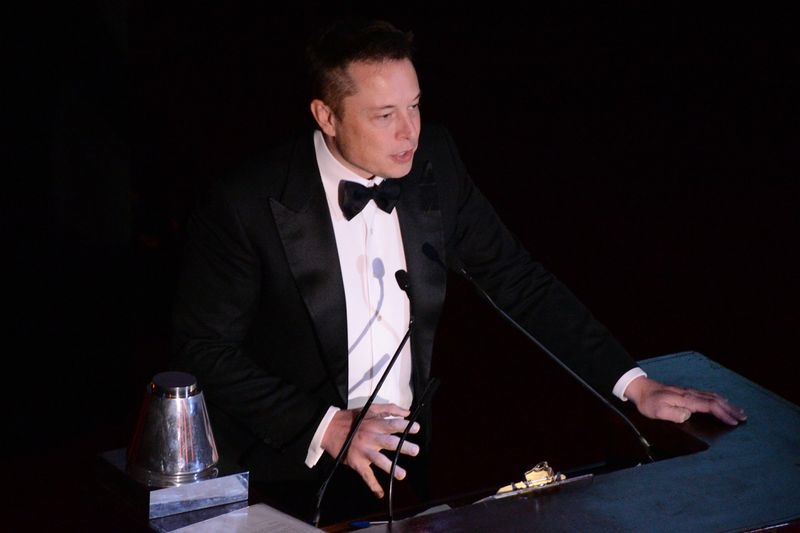Elon Musk Says SpaceX Making 'Progress' Toward Mars Colony

LOS ANGELES — Billionaire Elon Musk said his private spaceflight company SpaceX has made some progress toward establishing a permanent colony on Mars — a longtime goal in the entrepreneur's push to help make humanity a multiplanet species.
"The reason SpaceX was created was to accelerate development of rocket technology, all for the goal of establishing a self-sustaining, permanent base on Mars," Musk told an audience here after receiving the Robert A. Heinlein Memorial Award during the 33rd annual International Space Development Conference on Friday (May 16). "And I think we're making some progress in that direction — not as fast as I'd like."
Musk cited the success of SpaceX's recent reusable rocket test on April 18 as a critical achievement on the road to Mars. During that test flight, SpaceX launched a two-stage Falcon 9 rocket from its Florida pad and then returned the rocket's first stage back to Earth to make a vertical "soft landing" at a target in the Atlantic Ocean, before splashing down. The mission also delivered supplies to the International Space Station using a SpaceX Dragon capsule. [Mars Sample-Return Idea with SpaceX Dragon (Images)]
While the returned Falcon 9 rocket stage ultimately broke apart in the water due to rough seas, Musk has said SpaceX aims to recover a returned Falcon 9 booster from the ocean later this year, attempt a landing on land by the end of 2014 and potentially reuse a Falcon 9 first stage in 2015.
"We're close to at least recovering and reusing the first stage," Musk said. "I think that if we can demonstrate recovery and reuse of the first stage, that will be really something."
Meanwhile, SpaceX is also developing the Falcon Heavy rocket, a heavy-lift variant that aims to be the world's most powerful rocket since NASA's Saturn V moon rocket. That mega-rocket could make its first launch by the end of this year.
The Hawthorne, California-based company has also set its sights on a manned Mars mission concept that would send human explorers to the Red Planet. Musk said SpaceX's vision for a Mars explorationcalls for a next-generation rocket "much bigger than Falcon Heavy" that would use a methane-based propulsion system.
Get the Space.com Newsletter
Breaking space news, the latest updates on rocket launches, skywatching events and more!
"I think that's the system that, at least according to my calculations, will enable someone to move to Mars for about half a million dollars," Musk said.
Musk admitted that not everyone would jump at the chance to pay $500,000 for a trip to Mars. But some adventurous people might.

"There will be those who can afford to go, and those who want to go," Musk said. "I think if we can achieve that intersection, then it will happen … and, hopefully, it will happen before I'm dead."
Musk founded SpaceX in 2002 with the goal of advancing manned spaceflight and lowering the cost of rocket launches. The company has a $1.6 billion contract with NASA to provide 12 cargo delivery missions to the International Space Station using its Falcon 9 rockets and Dragon spacecraft.
The April 18 Falcon 9 rocket launch marked SpaceX's third Dragon delivery flight for NASA. The Dragon spacecraft returned to Earth on Sunday (May 18) in order to return science experiments and other gear to Earth.
SpaceX has launchpads at Cape Canaveral Air Force Base in Florida and Vandenberg Air Force Base in California, and recently leased the history Launch Pad 39A at NASA's Kennedy Space Center in Cape Canaveral for future flights.
Email Tariq Malik at tmalik@space.com or follow him @tariqjmalik and Google+. Follow us @Spacedotcom, Facebook and Google+. Original article on Space.com.
Join our Space Forums to keep talking space on the latest missions, night sky and more! And if you have a news tip, correction or comment, let us know at: community@space.com.

Tariq is the Editor-in-Chief of Space.com and joined the team in 2001, first as an intern and staff writer, and later as an editor. He covers human spaceflight, exploration and space science, as well as skywatching and entertainment. He became Space.com's Managing Editor in 2009 and Editor-in-Chief in 2019. Before joining Space.com, Tariq was a staff reporter for The Los Angeles Times covering education and city beats in La Habra, Fullerton and Huntington Beach. In October 2022, Tariq received the Harry Kolcum Award for excellence in space reporting from the National Space Club Florida Committee. He is also an Eagle Scout (yes, he has the Space Exploration merit badge) and went to Space Camp four times as a kid and a fifth time as an adult. He has journalism degrees from the University of Southern California and New York University. You can find Tariq at Space.com and as the co-host to the This Week In Space podcast with space historian Rod Pyle on the TWiT network. To see his latest project, you can follow Tariq on Twitter @tariqjmalik.









